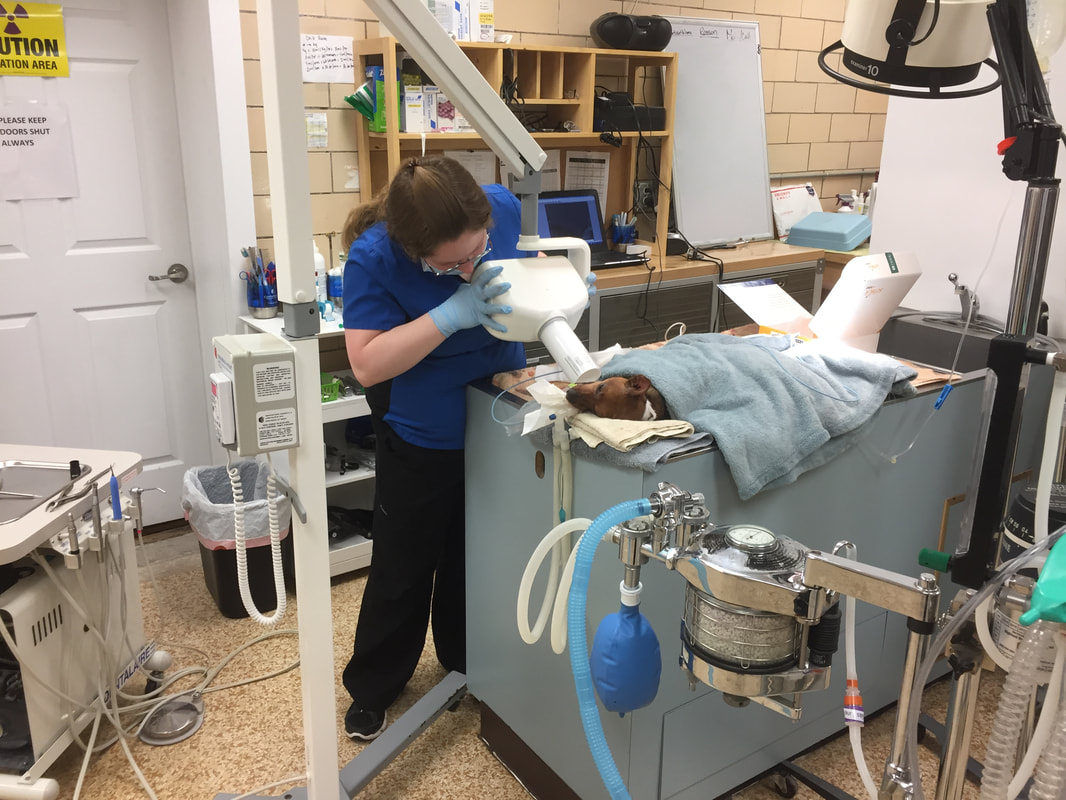Dental Care
Dental care is an extremely important and frequently overlooked aspect in the health and longevity of your pet. Bad breath, known as halitosis, is not a normal condition. Periodontal disease is the most common cause, and is easy to prevent and treat. Other causes of halitosis exist, but they are short term. A thorough oral exam is the best way to identify the cause and help you to formulate a treatment plan.
|
The American Veterinary Dental Society reports that varying degrees of dental disease are present in all pets by their 3rd birthday. Dental disease begins as plaque-a buildup of bacteria on the teeth and gums. Plaque is soft and frequently difficult to see. Animals that have mild buildup of plaque often respond to in home dental hygiene techniques the best. Eventually the plaque becomes mineralized and turns into tartar or calculus. The calculus deposits are impossible to rub or brush off the teeth and gums. By the time that the calculus has appeared there can be damage to the gums and tooth roots. Many times this damage cannot be reversed, and teeth may have to be extracted.
|
Other health risks can accompany dental disease. It is very common for the bacteria in the mouth to travel throughout the body and infect organs like the liver, kidneys, bladder, and heart. Once these organs become infected it can be difficult to detect until major, irreversible damage occurs. Some of the signs of extreme periodontal disease requirring immediate veterinary attention are as follows, foul breath, yellow, brown, or purple discoloration to the teeth, Red swollen bleeding gums, excessive drooling, blood in the saliva or on a toy, Broken teeth, Reluctance or hesitation to chew, shifting the food around in the mouth ehile eating, Reluctance or refusal to eat. It is impossible to do a complete dental exam on an awake patient. A general assesement of your pet's teeth can be made during a routine exam.
There is much more information gained while doing a complete oral exam under anesthesia. This information may lead to the necessary extraction of teeth in order to properly maintain the oral health of your pet. If you have concerns about the possible extraction of teeth, please feel free to discuss this with your veterinarian prior to the dental appointment. Please also remember that we reccommend pre-anesthetic blood work toassess the overall health of your pet prior to anesthesia. We may also send antibiotics home before or after the dental procedure to prevent or treat infection.
There is much more information gained while doing a complete oral exam under anesthesia. This information may lead to the necessary extraction of teeth in order to properly maintain the oral health of your pet. If you have concerns about the possible extraction of teeth, please feel free to discuss this with your veterinarian prior to the dental appointment. Please also remember that we reccommend pre-anesthetic blood work toassess the overall health of your pet prior to anesthesia. We may also send antibiotics home before or after the dental procedure to prevent or treat infection.
